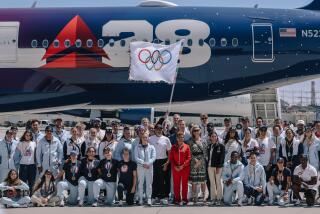View From Turin Is Impressive
- Share via
SALT LAKE CITY — No less an authority than Jean-Claude Killy says that the Winter Games of 2006, in Turin, Italy--the city Italians call Torino--ought to be fantastic.
Killy was the skiing star of the 1968 Grenoble Winter Games. He ran the 1992 Winter Games in Albertville, France.
He was the IOC’s No. 2 official in charge of monitoring progress for the Salt Lake Games. Now he’s the IOC’s chief liaison to the Turin Games.
“Italy and Torino have the roots, l’histoire, to organize something very special,” Killy said in an interview.
“Very Mediterranean. Very culturistic. It will be very different,” not better, not worse, just different, he later emphasized, “from here.”
If the six-minute Torino segment in Sunday night’s closing ceremony is any indication, expect a distinctly Italian but thoroughly up-to-date take on the Olympics featuring sport, technology and, of course, style.
No matter that it was freezing cold Sunday night.
In what was billed as a “celebration of Italian fashion,” models wearing Valentino, Versace and Dolce & Gabbana outfits sashayed along stages in the Stadium, as if Salt Lake City were a natural place to show off haute couture.
The Italians also trotted out the musical standard “Volare”--but it was sung by pop diva Irene Grandi.
The after-show invite for selected guests read, “See you in Torino 2006. The adventure begins. With a party.”
One of the key differences between Turin and Salt Lake is that, unlike here, there are no plans there to take over a downtown parking lot and make it an Olympics medals plaza.
Turin, in northwest Italy, capital of the country’s Piedmont region, already offers scores of arcades and plazas where people naturally gather “to make celebrations,” said the former mayor of the city, Valentino Castellani, now president of the Torino 2006 organizing committee.
About 40% of the venues for 2006 need construction work. But Castellani and others said plans are on schedule--as long as the work starts this year.
Asbestos was recently discovered at the proposed site of the bobsled run; a decision on whether to move it will be made next month.
The organizing committee’s other priorities include a make-over of the figure skating arena, an architectural “masterpiece” from 1961 in need now of renovation, Castellani said.
Also on tap for this year are the signing of various marketing deals. Castellani said deals are ready--simply waiting for the end of the Salt Lake Games. Torino 2006 expects an operating budget surplus of about $25 million.
Capital costs are projected to total about $1.4 billion, with considerable funding provided by national and local government.
Castellani expressed hope that security at the Games may not need to be as tight in four years. Perhaps, he said, “The world will not be in an emergency, let’s say better than it is now.”
David Neal, a senior NBC producer who has visited Turin within recent months and is one of the few Americans with an insider’s knowledge of preparations for the 2006 Games, said the organizing committee is “almost astonishingly ahead of schedule.”
Also impressive, he and others said, is the level of organization within the committee. In large measure, that’s due to stability. Unlike the Athens 2004 Summer Games organizing committee, which has seen considerable turnover, Castellani, deputy president Evelina Christillin and others have been working together toward 2006 for years--before Turin even was awarded the Games, in 1999.
“Being the same for four years means something,” Christillin said.
Turin has a reputation as something akin to the Detroit of Italy--a city known more for its considerable manufacturing and industrial concerns than as an internationally renowned tourist destination.
With the 2006 Games, Castellani said, “Our goal is to be one of the important cities in Europe.”
Christillin said: “We can never pretend to be Florence or Rome. But when a [visitor] comes, they are surprised.”
More to Read
Go beyond the scoreboard
Get the latest on L.A.'s teams in the daily Sports Report newsletter.
You may occasionally receive promotional content from the Los Angeles Times.






